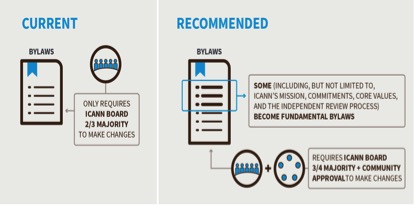By Aarti Bhavana
Recommendations 3 and 10
As we fast approach the ICANN55 meeting at Marrakech, we continue our series of posts tracking the CCWG-Accountability process. Previous posts in this series can be read here, hereand here. This post examines Recommendation #3: Redefining ICANN’s Bylaws as ‘Standard Bylaws’ and ‘Fundamental Bylaws’, and Recommendation #10: Enhancing the accountability of Supporting Organizations and Advisory Committees. It also studies the process of developments in these recommendations, since the 3rd draft proposal was opened for public comments.
Recommendation 3: Redefining ICANN’s Bylaws as ‘Standard Bylaws’ and ‘Fundamental Bylaws’
The 3rd draft proposal further refined the concept of fundamental bylaws by recommending the splitting of ICANN bylaws into ‘Fundamental Bylaws’ and ‘Standard Bylaws’. Fundamental bylaws are harder to change, and include the Mission, Commitments and Core Values, the seven community powers, and the framework for Independent Review Process, to name a few. Public consultations are to be undertaken before any changes are made to either standard bylaws or fundamental bylaws. Changes to fundamental bylaws would additionally require a 75% approval from the ICANN Board as well as approval from the community.
Source: CCWG-Accountability Supplemental Final Proposal on Work Stream 1 Recommendations, Annex 03.
The Board was in support of this recommendation, since it formalized the involvement of the community in major bylaw changes. The public comments also supported the adoption of this recommendation, with no major issues raised.
The matters discussed in the calls[1] were more in the form of clarifications. It was clarified that the IANA Functions Review provisions only apply to IANA’s domain name management function, as part of the CWG-Stewardship requirements. Further, the Empowered Community has also been given the right to approve amendments to the Articles of Incorporation in a process similar to the one provided for fundamental bylaws, to ensure that fundamental bylaw provisions aren’t subverted by amendments to the Articles. CCWG-Accountability’s independent counsel also recommended that the Empowered Community be provided the right to approve the transfer of all or substantially all ICANN assets, to solidify the community’s say in important matters, including changing ICANN’s legal jurisdiction. Finally, the right to inspect and the right to investigate have been added as fundamental bylaws, in keeping with the changes made to Recommendation #1. The Articles of Incorporation will be suitably modified to reflect these changes.
The entire CCWG-Accountability process has been directed towards solidifying the Empowered Community’s powers, to ensure that ICANN and its Board are accountable to the Community. However, accountability cuts both ways, and with the set of new powers being given to the participating SO/ACs, it is necessary to ensure that these bodies are accountable and transparent themselves.
Recommendation #10: Enhancing the accountability of Supporting Organizations and Advisory Committees
The 3rd draft proposal provided for this to be implemented in a staged process. In Work Stream 1, this will be achieved by including the review of SO/AC accountability mechanisms in the independent structural reviews performed regularly. However, the bulk of this discussion shall take place in Work Stream 2, including the proposal to add SO/AC accountability to the Accountability and Transparency Review Process.
While public comments were largely in favour of this recommendation, the major concerns raised were (1) that GAC should be subject to the same accountability standards as the other organizations, and (2) that independent reviews should be done at the request of a majority of the SO/ACs, and any recommended changes should only occur with the approval of the Empowered Community. These concerns were echoed by the GNSO as well, and discussed in the calls.[2]
(1) GAC Accountability
The CCWG-Accountability proposed that SO/AC accountability be enhanced in Work Stream 1 by including, through an amendment, a review of its accountability mechanisms in theorganizational reviews performed regularly. Article 4, Section 4 of the ICANN bylaws require periodic review of the SO/ACs, with the exception of GAC, which is permitted to provide its own review mechanisms. As mentioned above, public comments found this exclusion to be problematic. In its comments, the GNSO stated that since GAC is sought to be empowered through Recommendations #1 and #11, it should also be subject to the same accountability standards as other decisional participants. After some discussion, it was decided that the Accountability and Transparency Review will assess the role and effectiveness of GAC’s interaction with the Board as well as the ICANN community, and make suggestions on how this can be improved.
(2) Top-Down Accountability Review
Another concern raised was over the current manner of handling SO/AC review results, which was considered top-down, with unilateral control held by the Board. The GNSO felt that this would allow the Board to be involved in the governance structure of SO/ACs, and instead expressed a preference for a community-led review process in keeping with ICANN’s bottom-up model of governance. This would entail independent reviews being done at the request of a majority of SO/ACs, and recommended changes occurring only with the approval of the Empowered Community. However, the Board expressed concern over removing the Board’s role in approving recommendations, stating that this would affect the independence of the review process. It was finally decided that a detailed working plan shall be developed in Work stream 2, taking into account the comments made during the public comment period.



Comments are closed